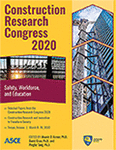Construction Research Congress 2020
Research into the Psychosocial Safety Climate of Engineering Construction Projects
Publication: Construction Research Congress 2020: Safety, Workforce, and Education
ABSTRACT
Psychosocial safety climate (PSC), an important measure of the psychological safety of employees and organizational health, has become a significant factor affecting psychological capital and thus affecting the outcome of engineering projects. This study aims to analyze the mental health and safety of construction workers in different situations. Based on 124 valid questionnaires collected from participants in Qianhai, Shenzhen, and 502 valid questionnaires from Guangzhou, this paper analyzes the PSC of engineering construction projects using the four-factor scale (PSC-12) from four dimensions of management support and commitment, management priority, organizational communication, and participation. It is found that, compared with ordinary engineering construction projects, there are higher PSC levels in megaprojects: the individual level of subjective initiative, the pursuit of self-worth, organizational level of funding, and political orientation can also effectively improve the PSC level. These research results can deepen the understanding of the PSC of engineering construction projects, and provide a practical reference for its improvement.
Get full access to this article
View all available purchase options and get full access to this chapter.
ACKNOWLEDGMENTS
The authors gratefully acknowledge the funding and support provided by the National Natural Science Foundation of China (NSFC) (Grand No. 71871096).
REFERENCES
Bond, S. A., Tuckey, M. R., and Dollard, M. F. (2010). “Psychosocial safety climate, workplace bullying, and symptoms of posttraumatic stress.” Organization Development Journal. 28(1),37.
Dollard, M. F., and Bakker, A. B. (2010). “Psychosocial safety climate as a precursor to conducive work environments, psychological health problems, and employee engagement.” Journal of Occupational and Organizational Psychology. 83(3),579-599.
Dollard, M. F. (2011). “Managing Psychosocial Risks in the Workplace: The Role of Issues.” Psychology Press, Routledge.
Hall, G. B., Dollard, M. F., and Coward, J. (2010). “Psychosocial safety climate: Development of the PSC-12.” International Journal of Stress Management, 17(4), 353.
Idris, M. A., Dollard, M. F., Coward, J., and Dormann, C. (2012). “Psychosocial safety climate: Conceptual distinctiveness and effect on job demands and worker psychological health.” Safety Science, 50(1), 19-28.
Law, R., Dollard, M. F., and Tuckey, M. R. (2011). “Psychosocial safety climate as a lead indicator of workplace bullying and harassment, job resources, psychological health and employee engagement.” Accident Analysis & Prevention, 43(5), 1782-1793.
Liu, J. (2014). “The psychosocial security atmosphere of medical staff and the impact of working resources on their work input.” Harbin Engineering University.
Rong, T. S. (2010). “AMOS and Research Methods.” Chongqing University PressAMOS and Research Methods.
Schaufeli, W. B., and Bakker, A. B. (2004). “Job demands, job resources, and their relationship with burnout and engagement: A multisample study.” Journal of Organizational Behavior, 25(3), 293-315.
Wang, A. (2014). “Synergic Mechanism for megaproject Crisis Management and Social Responsibility Fulfillment.” International Symposium on Computational Intelligence and Design, 76-79.
Wang, D., Fu, H., and Fang. S. (2019). “The Relationship Between Relational Quality and megaproject Success: The Moderating Role of Incentives.” Engineering Management Journal, 1-13.
Winch, G. M. (2016). “Industrial megaprojects: Concepts, Strategies and Practices for Success.” Construction Management & Economics, 30(8), 1-4.
Xie, X.Y. (2017). “Research on the psychological social security atmosphere of nursing teams in China.” Southwest University for Nationalities.
Xu, J., Zhu, A. B., and Liu, Y. M. (2017). “Current situation and future of qianhai comprehensive pipe gallery in shenzhen.” Urban and rural construction, (21), 48-50.
Zeng, S. X.(2018). “ Major project management.” Scientific observation, 13(06), 45-47.
Information & Authors
Information
Published In
Construction Research Congress 2020: Safety, Workforce, and Education
Pages: 231 - 238
Editors: Mounir El Asmar, Ph.D., Arizona State University, David Grau, Ph.D., Arizona State University, and Pingbo Tang, Ph.D., Arizona State University
ISBN (Online): 978-0-7844-8287-2
Copyright
© 2020 American Society of Civil Engineers.
History
Published online: Nov 9, 2020
Published in print: Nov 9, 2020
Authors
Metrics & Citations
Metrics
Citations
Download citation
If you have the appropriate software installed, you can download article citation data to the citation manager of your choice. Simply select your manager software from the list below and click Download.
